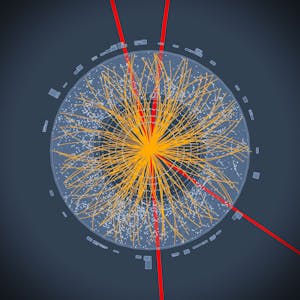Come delve into the fascinating world of subatomic physics with the "Physique des particules - une introduction" course by University of Geneva. This comprehensive introduction delves into the physics of the nucleus and elementary particles, addressing fundamental concepts and their practical applications.
Throughout this course, you'll explore the properties of atomic nuclei, techniques for accelerating and detecting particles, and the profound insights gained from high-energy particle reactions and decays. Gain a deep understanding of electromagnetic, strong, and weak interactions, and their significance in understanding the subatomic world. Moreover, delve into the mass of subatomic objects and the role of the Higgs boson, as well as the implications of particle physics for astrophysics and the wider universe.
Certificate Available ✔
Get Started / More Info
This course is structured into seven modules, covering a wide range of topics in subatomic physics. From the fundamental concepts to practical applications, participants will gain a comprehensive understanding of the physics of the nucleus and elementary particles, their interactions, and their implications for astrophysics and the universe.
Module 1: Matière et forces, mesurer et compter
Module 1 provides a comprehensive introduction to the fundamental concepts of subatomic physics, including the measurement and counting of matter and forces. Participants will explore topics such as the properties of matter, forces, and probability, and gain insights into the experimental basis of these concepts through the Rutherford experiment. The module also covers the presentation of instructors and includes a summative quiz.
Module 2: Physique nucléaire
Module 2 delves into nuclear physics, covering the mass, size, and spin of nuclei, nuclear models, radioactivity, nuclear energy, and fusion. Participants will explore the principles of nuclear physics, the structure of nuclei, and their practical applications, including radiocarbon dating and nuclear energy production. The module also includes a summative quiz to test participants' understanding.
Module 3: Accélérateurs et détecteurs
Module 3 provides an in-depth exploration of accelerators and detectors in subatomic physics. Participants will gain insights into the principles of particle acceleration, focusing, and various types of detectors used in experimental particle physics. The module covers the application of these technologies in studying heavy and light particles, photons, and ionization. A summative quiz is included to assess participants' comprehension.
Module 4: Interactions électromagnétiques
Module 4 focuses on electromagnetic interactions in subatomic physics, covering topics such as electromagnetic scattering, spin, and magnetic moments. Participants will explore phenomena like Compton scattering, electron-positron annihilation, and gain a deep understanding of describing reactions in subatomic physics. The module also includes a summative quiz to test participants' knowledge.
Module 5: Hadrons et interactions fortes
Module 5 delves into the study of hadrons and strong interactions in subatomic physics. Participants will explore topics such as elastic and inelastic scattering, quarks, resonances, and color and strong interactions. The module provides a comprehensive understanding of hadronization, jets, and their practical implications. A summative quiz is included to assess participants' understanding.
Module 6: Interactions électro-faibles
Module 6 provides an in-depth exploration of weak interactions in subatomic physics, covering topics such as particle-antiparticle transformations, weak interactions, and the W and Z bosons. Participants will gain insights into neutrino scattering, weak decays of quarks, and the role of the Higgs mechanism. The module also includes a summative quiz to assess participants' comprehension.
Module 7: Matière et énergie sombre
Module 7 explores the concepts of dark matter and dark energy in subatomic physics, covering topics such as the Big Bang, dark matter, dark energy, and their implications. Participants will gain insights into the origins of the universe and the mysteries of dark matter and dark energy. The module includes a summative quiz to test participants' understanding.
Advanced Spacecraft Dynamics and Control is a specialized course for experienced engineers, offering advanced insights into modeling spacecraft dynamics with time-varying...
This course delves into advanced analytical mechanics methodologies to develop spacecraft dynamics equations efficiently.
Introduzione alla fisica sperimentale: meccanica, termodinamica is a comprehensive course covering the fundamental principles of mechanics and thermodynamics, preparing...
Introduction to Optics (1) provides a comprehensive understanding of optical phenomena in daily life and scientific applications, featuring abundant examples and...